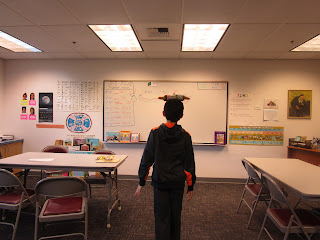I also shared that the version of the story of Esther included in the TANA'CH never mentions God, is the only book in the Bible which doesn't take place even partially in the Land of Israel, and which heroes are named after Babylonian and Persian gods (Marduk/Mordechai, Astarte/Esther). Why would the Rabbis decide to include Megillat Ester in the TANA'CH? !
According to Talmudic era Rabbis, there are 10 Jewish values incorporated into the story, which are so important that the entire Megillah merited inclusion in the final canonized version of the Bible. Some of the values are giving tz'daka to the poor, celebrating our victories together as a community, fasting to clear our minds and strengthen our souls to enable us to better focus when confronted with a dangerous mission or a great problem, and being responsible for other Jews. We used the rest of our session to explore the 10 values, by asking the students to underline where they found these values in the story itself.
Since Purim began Wednesday evening, Rabbi Greninger decided to have a uniquely "Purimesque" tefillah session each day:
Of course, we couldn't let a Purim session go by, without having fun with our Hebrew Through Movement commands:
 |
| Daniel, la'seem sefer al ha'rosh v'la'lechet blee yada'eem al ha'sefer. (Daniel, put a book on the head and walk without hands on the book.) |
 |
| Daniel, la'seem keter shel melech al ha'sefer al ha'rosh, v'lo la'seem yada'eem al ha'sefer v'keter. (Daniel, put a king's crown on the book on the head, and don't put hands on the book and crown.) |
 |
| Michael, la'seem megillat ester al ha'rosh. (Michael, put the Scroll of Esther on the head.) |
 |
| Michael, la'lechet eem megillat ester al ha'rosh, blee yada'eem al ha'megilla. (Michael, walk with the Scroll of Esther on the head without hands on the megillah.) |
And to round out our session each day, Ben taught us more Purim songs - below we're singing "Utzoo Eytza V'Toofar."
Hopefully, you all enjoyed the Purim holiday. Now we look ahead to Pesach (Passover), which falls exactly one Jewish month after Purim (i.e. the next full moon!).
No comments:
Post a Comment